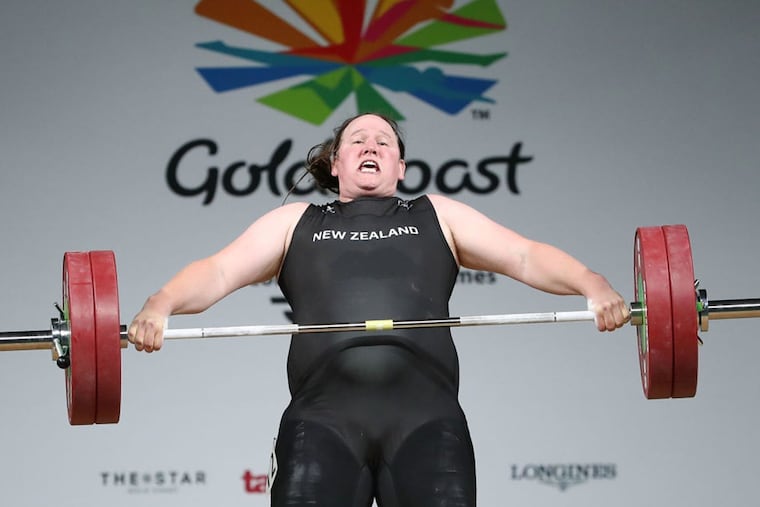We need to be able to talk about trans athletes without shouting each other down | Opinion
Anti-trans discrimination is real, and it is poisonous. But if anyone questioning whether it’s fair for trans athletes to compete gets labeled a transphobe, then we can’t talk at all.

Should trans women athletes be allowed to compete against other women? It’s a tough question, and I don’t know the answer. But here’s what I do know: We’ll never figure it out if we adopt knee-jerk defenses and call each other names.
Witness the burst of social media vituperation after Lia Thomas — a trans woman swimmer at Penn, where I teach — shattered three school records for women and two Ivy League records at a meet earlier this month. Critics of Thomas called her a “biological male” and even suggested that she add an “r” to her first name (to spell “Liar”). Meanwhile, defenders suggested that anyone questioning her participation in women’s events was “transphobic.”
Let’s be clear: Calling Lia Thomas a liar is transphobic. Transgender people face enormous prejudice and discrimination in our society. Why would they choose to subject themselves to such abuse unless they knew — in their bones, and in their hearts — that their gender did not accord with the sex assigned to them at birth? To suggest that they are pretending is itself a lie, and a terrible slur as well.
» READ MORE: ‘They just want the chance to play’: Reject transgender sports bans | Opinion
But it’s also unfair to call everyone who questions Thomas’ athletic achievements a “transphobe.” And if you think otherwise, watch the video op-ed published in the New York Times earlier this year by Andie Taylor, a trans woman and competitive long-distance runner, who worries that she may have an improper leg up. “I only want to win if I know it’s fair,” she declared.
In her op-ed, Taylor condemned legislative efforts underway in several states — including Pennsylvania — to prohibit trans athletes from competing against other members of their gender. Such measures are inspired by “discrimination and fear,” she correctly noted, and have “nothing to do with science.”
And yet the science of the matter is hardly settled, as Taylor also acknowledged. The most cited study — showing that trans women runners were no more competitive running against women than against men — examined only eight runners. There simply aren’t enough athletes who have come out as trans for researchers to know what kind of advantage it confers.
But it is reasonable to ask whether Lia Thomas is getting one. She didn’t simply set new records at the recent meet; in the freestyle final, she finished 38 seconds ahead of the next-fastest swimmer. As sports journalist Joe Kinsey observed, this wasn’t just a victory; it was an annihilation.
If Thomas gets closer to the times she compiled when she was competing in the men’s events, she might even break college swimming records held by Olympians like Missy Franklin and Katie Ledecky. You don’t have to be a transphobe to wonder if that’s fair.
And the more we engage in reckless charges of transphobia, the harder it will be to engage in the conversation that we need. Thus far, two of Thomas’ teammates have given interviews criticizing Penn for letting her compete in women’s meets. But both of them requested anonymity, fearing accusations of bigotry from the community; one said she worried she wouldn’t be able to find a job after college.
To repeat: Anti-trans discrimination is real, and it is poisonous. But if anyone questioning Thomas’ records gets labeled a transphobe, then we can’t talk at all. That’s like saying anyone who criticizes Israeli policies in the West Bank is an anti-Semite. It shuts down conversation before it can even start.
Of course there are bigoted and prejudiced people in the world. But if you assume that everyone who disagrees with you is a bigot, you’re engaging in an act of prejudice yourself. And it prevents you from gaining the knowledge and understanding that comes from real dialogue across our differences.
“Of course there are bigoted and prejudiced people in the world. But if you assume that everyone who disagrees with you is a bigot, you’re engaging in an act of prejudice yourself.”
I don’t want state legislatures restricting what trans athletes can do. Nor do I want brave trans women like Lia Thomas and Andie Taylor to suffer more ridicule and hatred than they already have. But as Taylor reminded us, it’s perfectly fair to question whether they should compete against other women. The bigger question is whether we can muster the courage to talk about it, fairly and openly, instead of shouting each other down with insults and slurs.
Jonathan Zimmerman teaches education and history at the University of Pennsylvania. He is the coauthor (with former Inquirer editorial cartoonist Signe Wilkinson) of “Free Speech: And Why You Should Give a Damn,” which was published in April by City of Light Press.